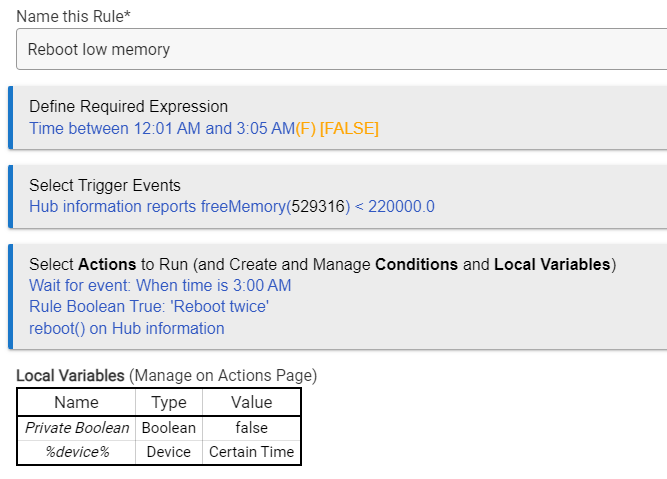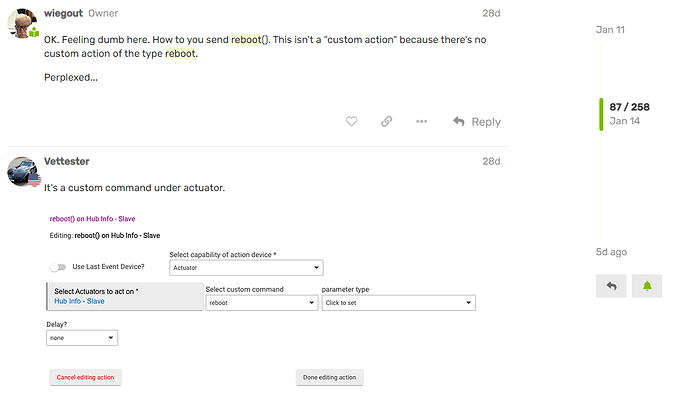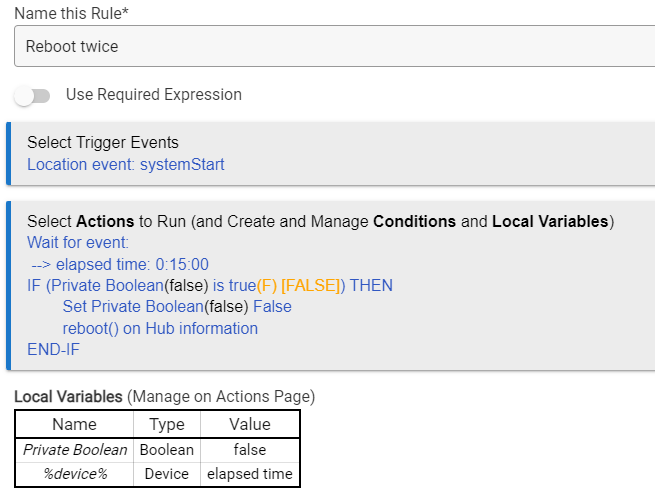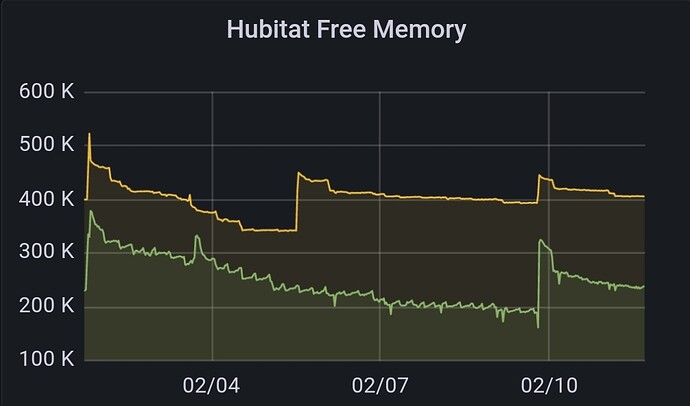I've been using an http post to reboot. Where do I access "reboot() on Hub Information". I have the Hub Information driver installed. Looking through the various rule action options is coming up empty for me. Obviously a forest for the trees thing 
I kind of fell like there is a placebo effect happening here. I think it is more about timing then It is about what actually happens.
It would be interesting to see what would happen if the user would hit the url right after a reboot a few times and see if he got similar numbers. After one and then two reboots.
See post#1.
I came to this conclusion some time ago. I've been tracking free memory via Hubigraph for several months and have noticed a significant jump in free memory after a second reboot following an auto restart from low memory < 220,000. Also after a hub update. When graphed it is rather obvious.
In the end, two rules. Low memory boot and reboot 15 minutes later if rebooted by the low memory rule. It was a useful exercise for me. Finally figured out the use of private booleans and an activator from a device.

I'm just unsure what you think the boost in free memory on the second reboot is going to give you...
Free memory steadily declines. The significant drops are at overnight hub cleanup, seems like that doesn't work so well. If I start from 150,000 higher I would think it would add the time it takes to loose 150,000 to the time required to reach a reboot point. If nothing else it was a useful exercise for me.
Yes and no. From the reboot it declines at its greatest rate from the time of the reboot. Then as the days pass it declines less and less. My system takes about a week to level off and at that point Ih am around 200MB free.
Below is my grafana graph that shows the last 10 days
The thing that really doesn't make sense with your hypothesis about gaining memory is there is a reboot around 2/4 on that graph were the hub was not only rebooted, but completely shut down and disconnected from power.
I should point out on that graph the yellow line is my development hub with very little running on it. The green line is my prod hub that actually runs my house. So again the more it is doing the more memory will be consumed.
Your graph may prove my point. The working hub starts around 380,000. That was typical of mine. A reboot shortly after that garnered me an additional 150,000 to 500+. The second boot of that hub looks to be around 325. Maybe play with what I set up and see if you have favorable results. No harm, no foul. Up until about four months ago I had a once a week reboot that I had carried over from a C-5. Never an issue. The timing was perfect and dumb luck. I should add that in the midst of this I uninstalled Maker API which I set up way back when with a bunch of devices and never really used. I'm hoping the next Hubitat generation will be sufficiently overpowered and fine tuned that none of this will be necessary. I've only ever rebooted my Ubiquity Edge routers and APs when doing a software update.
I don't think I ever disputed where you were memory was starting from, but if you should be needed to do a second reboot in the first place to recover additional memory.
That additional memory though nice may be a placebo effect if the memory drops to that level quickly anyways. I wouldn't be as concerned about the starting point as were and when it stabilizes.
My graph was to show two things.
- The idea of two reboots to increase memory involves something else as my hub that was upgraded and then shut down completely and had power pulled still only showed 340+ MB of memory free.
- The memory stabilized after about a week being just under 200MB of memory.
Normally I dont reboot my hub unless there is a firmware update similar to how you manage your switch.
Great idea. I just do my reboot on a schedule.
Hubs should not need rebooting. Both of mine are rebooted for platform updates, and power outages. I’m not sure what rebooting on a schedule achieves - seems to me that it just ignores resolving the underlying issue that necessitates a routine reboot.
I don't disagree. The hub needs a Free Memory logging tool. There are intermittent large drops the source of which are not readily identifiable even when graphed in some detail. Having a good idea of when has not enabled me to track down the what.
I just did a single reboot on both of my hubs to validate my experience. So it was just under 24 hours since the previous one for .148. Both of them did end up with much higher starting memory then the previous reboot.
My suspicion is that this is relates to something being cleaned up on alternating reboots that is also done periodically when the hub is up.
So basically if you do two reboots before that cleanup is processed on a regular basis you see this memory increase.
I do remember at one point hearing about something scheduled in this manor by support.
That said these systems should not need to be rebooted because you see FreeOSMemory getting low. All that should happen because of frequent reboots is slowdowns and delays because you have to load stuff back into memory.
It is a good thing to use memory and see it used in most cases.
Where do you get this data? Is there an app I should be using?
Many of us use the Hub info driver from @thebearmay and maybe in combination with Node-Red. The graphing is often done with either Hubigraphs on the hub, or a combination of Influxdb and Grafana on external gear to the hub.
That's awesome!
It would be nice to get a definitive answer from support about this. There is clearly something happening that on occasion releases a bunch of memory, but a double reboot isn't exactly it.
It would be nice if @gopher.ny or @bobbyD could altast provide a clue of why this is happening and if there is really any benefit to actually trigger whatever process is releasing the extra memory. I went back on Grafana and checked all the way back a year. It looks like i haven't this amount of memory free immediately following a reboot for a while. I don't exactly think it provides much if any benefit as in less then 24 hours my memory dropped from 546MB to 381MB. That is a significant drop that I suspect will level out quickly in the next day or so.
This topic was automatically closed 365 days after the last reply. New replies are no longer allowed.




